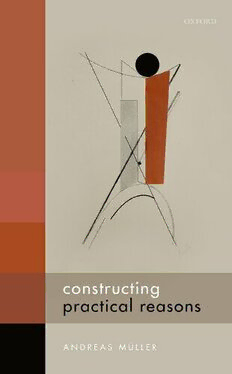Table Of ContentOUPCORRECTEDAUTOPAGEPROOFS–FINAL,3/7/2020,SPi
Constructing Practical Reasons
Somethingsarereasonsforustoperformcertainactions.Thatitwillspareyou
greatpaininthefuture,forexample,isareasonforyoutogotothedentistnow,
and thatyouarealreadylateforworkisareasonforyounottoread thenext
articleinthemorningpaper.Whyaresuchconsiderationsreasonsfororagainst
certainactions?Constructivismoffersanintriguinganswertothisquestion.Its
basicideaisoftenencapsulatedinthesloganthatreasonsarenotdiscoveredbut
madebyus.AndreasMüllerelaboratesthisideaintoafullyfledgedaccountof
practical reasons, makes its theoretical commitments explicit, and defends it
againstsomewell-knownobjections.
ConstructingPracticalReasonsbeginswithanexaminationofthedistinctive
role that reason judgements play in the process of practical reasoning. This
providestheresourcesforananti-representationalistconceptionofthenatureof
thosejudgements,accordingtowhichtheyaretrue,iftheyaretrue,notbecause
they accurately represent certain normative facts, but because of their role in
sound reasoning. On the resulting view, a consideration owes its status as a
reasontothetruthofthecorrespondingreasonjudgementandthus,ultimately,
tothesoundnessofacertainepisodeofreasoning.Consequently,ourpractical
reasonsexhibitakindofmind-dependence, butthisdoesnotforceustodeny
theirobjectivity.
OUPCORRECTEDAUTOPAGEPROOFS–FINAL,3/7/2020,SPi
OUPCORRECTEDAUTOPAGEPROOFS–FINAL,3/7/2020,SPi
Constructing Practical
Reasons
ANDREAS MÜLLER
1
OUPCORRECTEDAUTOPAGEPROOFS–FINAL,3/7/2020,SPi
3
GreatClarendonStreet,Oxford,OX26DP,
UnitedKingdom
OxfordUniversityPressisadepartmentoftheUniversityofOxford.
ItfurtherstheUniversity’sobjectiveofexcellenceinresearch,scholarship,
andeducationbypublishingworldwide.Oxfordisaregisteredtrademarkof
OxfordUniversityPressintheUKandincertainothercountries
©AndreasMüller2020
Themoralrightsoftheauthorhavebeenasserted
FirstEditionpublishedin2020
Impression:1
Allrightsreserved.Nopartofthispublicationmaybereproduced,storedin
aretrievalsystem,ortransmitted,inanyformorbyanymeans,withoutthe
priorpermissioninwritingofOxfordUniversityPress,orasexpresslypermitted
bylaw,bylicenceorundertermsagreedwiththeappropriatereprographics
rightsorganization.Enquiriesconcerningreproductionoutsidethescopeofthe
aboveshouldbesenttotheRightsDepartment,OxfordUniversityPress,atthe
addressabove
Youmustnotcirculatethisworkinanyotherform
andyoumustimposethissameconditiononanyacquirer
PublishedintheUnitedStatesofAmericabyOxfordUniversityPress
198MadisonAvenue,NewYork,NY10016,UnitedStatesofAmerica
BritishLibraryCataloguinginPublicationData
Dataavailable
LibraryofCongressControlNumber:2020935466
ISBN978–0–19–875432–9
PrintedandboundinGreatBritainby
ClaysLtd,ElcografS.p.A.
LinkstothirdpartywebsitesareprovidedbyOxfordingoodfaithand
forinformationonly.Oxforddisclaimsanyresponsibilityforthematerials
containedinanythirdpartywebsitereferencedinthiswork.
OUPCORRECTEDAUTOPAGEPROOFS–FINAL,3/7/2020,SPi
Contents
Acknowledgements vii
Introduction 1
1. What is constructivism? 6
1.1 Thebasicidea 6
1.2 Constructivismandrepresentation 7
1.3 Constructivismandtruth 13
1.4 Constructivismandmind-dependence 17
1.5 Constructivism,explanation,andthegroundingrelation 20
1.6 Puttingconstructivismonthemap 26
1.7 Planofthebook 31
2. Reasoning and reason judgements 33
2.1 Preliminaries 33
2.2 Conditionsofadequacy 41
2.3 Thenormativeguidanceaccount 44
2.4 Theinadequacyofalternativeaccounts 52
2.5 Reasoningandconceptualsophistication 65
2.6 Regressworries 72
2.7 Metareasoning 77
3. The nature of reason judgements 82
3.1 Preliminaries 82
3.2 Guidanceandrepresentation 89
3.3 Constructivismandexpressivism 100
3.4 Extendingtheaccount 107
4. The truth about reasons 110
4.1 Constructivism,correspondence,anddeflationism 111
4.2 Towardsacompatibletheoryoftruth 114
4.3 Wrightontruth 116
4.4 Alethicpluralism 120
4.5 Truthandsoundreasoning 128
4.6 Constructingreasons 137
OUPCORRECTEDAUTOPAGEPROOFS–FINAL,3/7/2020,SPi
vi
5. Correct reasoning 141
5.1 Correctandincorrectreasoning 142
5.2 Correctnessandreasons 145
5.3 Correctnesswithoutreasons 156
5.4 Theconstitutiverulesaccountofcorrectreasoning 159
5.5 Developingtheaccount 163
5.6 Howtodeterminetherulesofreasoning 172
5.7 Thestatusoftherulesofreasoning 185
6. Mind-dependence and objectivity 189
6.1 Thevarietiesofmind-dependence 190
6.2 SidingwithEuthyphro 197
6.3 Fallibilityanduniversality 200
6.4 Modalrobustness 206
Concluding remarks 219
References 223
Index 233
OUPCORRECTEDAUTOPAGEPROOFS–FINAL,3/7/2020,SPi
Acknowledgements
This book grew out of my doctoral dissertation, which I submitted to
Humboldt-UniversitätzuBerlininAugust2013.Alotoftimehaspassed
sincethen,andwhilethepositionIdevelopinthisbookhasnotchanged,
some of the arguments and a lot of the text that presents them have.
Writing this book and the dissertation on which it is based would not
have been possible without the support of a number of persons and
institutions. First and foremost, I am greatly indebted to my PhD
supervisor at Humboldt, Thomas Schmidt, who has supported and
encouraged me not only throughout the time I worked on the disserta-
tion, but also a long time before I had even thought about pursuing a
doctorateinphilosophy.Hisinsightful commentsandsuggestionswere
immenselyhelpfulinshapingmythinkingaboutthetopicofthisbook.
DuringaresearchvisitspentatthePhilosophyDepartmentofPrinceton
Universityinthespringtermof2012,MichaelSmithwasverygenerous
with his time and his comments, for which I am very grateful. Our
conversations, in Princeton and on various later occasions, helped me
to develop a clearer perspective on many of the issues that I discuss in
whatfollows.
Many people helped me to improve the material that found
its way into this book. I have greatly benefited from conversations
with and comments from Maike Albertzart, Hannah Altehenger, Max
Barkhausen, Philipp Brüllmann, Anne Burkard, Andreas Cassee,
Christopher Cowie, Sinan Dogramaci, Gerhard Ernst, Daan Evers,
Christoph Fehige, Simon Gaus, Jan Gertken, Stefan Gosepath, Logi
Gunnarsson, Tim Henning, Ulf Hlobil, Rebekka Hufendiek, Benjamin
Kiesewetter, Christian Kietzmann, Felix Koch, Errol Lord, David
Löwenstein, Barry Maguire, Susanne Mantel, Leo Menges, Cory
Nichols, Herlinde Pauer-Studer, Peter Schaber, Oliver Schott, Moritz
Schröder, Sharon Street, Christine Tiefensee, Barbara Vetter, Jay
Wallace,RalphWedgwood,andJackWoods,aswellastwoanonymous
OUPCORRECTEDAUTOPAGEPROOFS–FINAL,3/7/2020,SPi
viii
readers for OUP. I would like to express my gratitude to all of these
people,andtothoseIhaveforgottentomention.Iamalsomuchobliged
toTimoJunger,whowasagreathelpinpreparingthefinalmanuscript.
Forvaluablediscussionsandcomments,Iwouldliketothankvarious
audiences in Berlin, Essen, Frankfurt, Munich, Münster, Konstanz,
Leipzig,Saarbrücken,Tübingen,andVienna,whereIhadtheopportun-
itytopresentearlierversionsofsomeofthematerialincludedhere.Iam
also grateful to Dominik Perler and his Leibnitz-Preis-Projekt, to the
Graduate School of Princeton University, to Humboldt-Universität zu
Berlin and the Sonderforschungsbereich 644, to the Studienstiftung des
deutschenVolkes,andtotheCentreforAdvancedStudyinBioethicsin
Münsterforsupportingmeandmywork,aswellastotheUniversityof
Bern and my colleagues here, for providing me with the opportunity to
continuedoingphilosophyinsuchanidealenvironment.Finally,Iowea
specialdebtofgratitudetomyparents,whoseunconditionalsupporthas
helped me on every step of the way, and to Moritz Schröder, who has
listened to my thoughts about this book and its contents with unfailing
patienceandencouragement.
Chapter2containsmaterialpreviouslypublishedinA.Müller(2019).
Reasoning and normative beliefs: not too sophisticated. Philosophical
Explorations 22(1), 2–15, which is reprinted here by permission of the
publisher(Taylor&FrancisLtd).
OUPCORRECTEDAUTOPAGEPROOFS–FINAL,1/7/2020,SPi
Introduction
Agents have reasons: some things are reasons for them to perform or
refrain from certain actions. That it will spare her great pain in the
future, for example, is a reason for an agent to go to the dentist now,
thatshepromisedherfriendtohelphimmoveisareasonforhertodo
so,andthatsheisalreadylateforworkisareasonforhernottoreadthe
nextarticleinthemorningpaper.Whatmakeseitheroftheseconsider-
ationsareasonfororagainsttherespectiveaction?Whydowehavesuch
reasons?Insomecases,anansweriseasytocomeby.Youmighthavea
reasontobuyatrainticketsimplybecauseyouhaveareasontogetfrom
BerlintoHamburg.Here,yourreasontobuytheticketcanbeexplained
intermsofanotherreasonfromwhichitderives.Butnotallreasonscan
bederivativereasons,sothiskindofanswerwillnotalwaysbeavailable.
Canwegiveamoregeneralexplanationwhysomethingisareasonforan
agent (not) to perform a certain action, one that applies to all such
reasons?
Somephilosophers,includingThomasScanlon(1998,ch.1;2014)and
Derek Parfit (2011a; 2011b), are sceptical about the feasibility of this
explanatory project. They deny that such a general account of our
practicalreasons—thatis,ourreasonsfororagainstperformingcertain
actions—canbeprovided.Wemightbeabletoexplain,ineachcase,why
thereason-givingfactholds,suchasthefactthatgoingtothedentistnow
willsparesomeonegreatpaininthefuture.Butthereasonfactitself,the
fact that this fact about the consequences of going to the dentist is a
reasonfortheagenttogo,cannotalwaysbeexplainedinaninformative
way:at leastsome reason facts areprimitive, fundamental facts,facts at
which our explanations come to an end. Others, like Michael Smith
(1994; 2013) and Mark Schroeder (2007), are more optimistic about
the prospects of giving a general account of practical reasons. They
emphasizethatwhatthereisreasontodoforanagentiscloselyrelated
ConstructingPracticalReasons.AndreasMüller,OxfordUniversityPress(2020).©AndreasMüller.
DOI:10.1093/oso/9780198754329.001.0001

